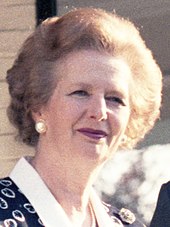
The Bruges speech was given by British prime minister Margaret Thatcher to the College of Europe at the Belfry of Bruges, Belgium, on 20 September 1988. Thatcher was opposed to any moves to transition the European Economic Community (EEC) into a federal Europe that would take powers away from its members. She considered European Commission president Jacques Delors a campaigner for federalisation and clashed with him publicly. Earlier in 1988, Delors had reaffirmed his commitment for the EEC to take a greater role in establishing European economic, fiscal and social legislation, which Thatcher considered provocative. On 8 September, Delors spoke to Britain's Trades Union Congress, calling for their support.
Thatcher had been invited to speak to the College of Europe in Bruges and decided to make her text a response to Delors' speech of 8 September. Thatcher's speech recounted Britain's history within and close connection to Europe and called for the EEC to resist a move towards centralisation of power. She called for reforms to the Common Agricultural Policy and for the EEC to continue to support the work of NATO. One of the most famous and controversial passages was her remark that "we have not embarked on the business of throwing back the frontiers of state at home only to see a European superstate getting ready to exercise a new dominance from Brussels".
Despite its commitment that Britain would work within the EEC to reform it, the speech was perceived as anti-Europe. The speech exposed a divide in the Conservative Party between those favouring federalisation and the majority who opposed it. Thatcher's foreign secretary Geoffrey Howe was greatly affected by the speech; his later support, with Chancellor of the Exchequer Nigel Lawson, for Britain to join the European Exchange Rate Mechanism eventually led to Thatcher's resignation. The Bruges Group, a British Eurosceptic think tank, was named after the speech. Some have described it as "setting the UK on the path to Brexit".